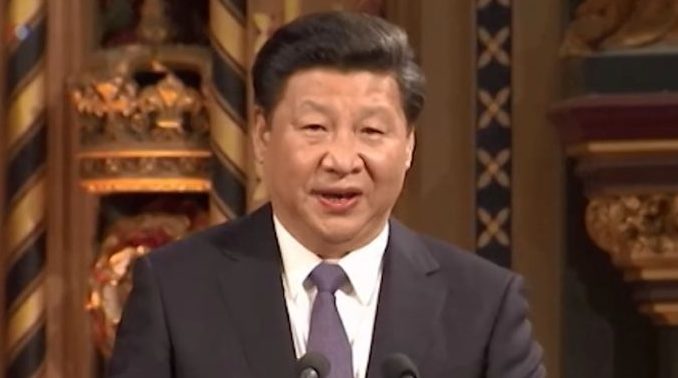
Chinese President Xi Jinping and Vice President Wang Qishan have, on successive days, publicly spoken about their dedication to global trade and free markets.
As CNBC reports, the keynote speaker at the China International Trade Expo on Sunday, Xi said the event “demonstrates China’s consistent position of supporting the multilateral trading system and promoting free trade. It is a concrete action taken by China to advance an open world economy and support economic globalization.”
Qishan specifically addressed the relationship with the United States at a Bloomberg-sponsored economic forum in Singapore a day later. From the South China Morning Post:
“China and the US both wish to expand cooperation on the economy and trade,” he said at the ballroom of the luxurious Capella Resort on Singapore’s Sentosa Island.
“The Chinese side is ready to have discussions with the US on issues of mutual concern to push for a proposal acceptable to both sides to resolve their economic and trade issues.”
The statements by two prominent Chinese leaders indicate that the country is attempting to position itself as the international champion of free trade, even as the United States embraces tariffs and protectionism.
President Jinping has been aggressively pursuing this stance for months, reaching out to countries in response to the US initiating tariffs against them. He has traveled to Africa and Latin America in an effort to expand the influence of Chinese trade beyond the Asian markets. He has hosted Justin Trudeau of Canada. He has recently begun his latest trip across Europe, starting in a longtime American ally, Poland.
China has a recent history of currency manipulation, which is arguably what spawned the frequent allegations of it by President Trump. Unfortunately for Trump supporters, that history seems to have ended around 2014. As China’s economy grew strong enough for it to thrive on its own merit, China seems to have systematically eliminated their policies of intentional currency devaluation.
It also has a policy of forced technology transfer, in which businesses which want access to Chinese markets must provide full details on the technology to Chinese officials for review… technology which has been repeatedly given to Chinese business to clone.
These are not the actions of a government which truly promotes free trade; but they are presenting themselves as such, taking advantage of the void left by the embrace of protectionism in the US and the internal conflicts facing the EU.
What’s worse is that, if recent history is any indicator, President Trump will agree to any deal which allows him to present an image of having succeeded on a major rhetorical point and which allows him to rename the deal. He did this with NAFTA, where jobs must now pay higher wages in Mexico if they reach a certain percentage of manufacturing, even though they’re not close to reaching that manufacturing percentage. He did this with the Korean trade agreement, where more cars are now allowed into South Korea even though South Korea wasn’t purchasing US cars at anything approaching the existing limit.
It is all too plausible that President Trump may enter into a trade agreement with China in exchange for them stopping their currency manipulation… which, as noted, they stopped doing around 2014.
The US needs to re-engage internationally on free trade, or at the very least abandon the current protectionist bent. To do otherwise is to continue to empower China, which is at best a friendly adversary, and at worst an active, though polite, enemy… as the threat to a US warship yesterday should demonstrate.

1 Trackback / Pingback
Comments are closed.